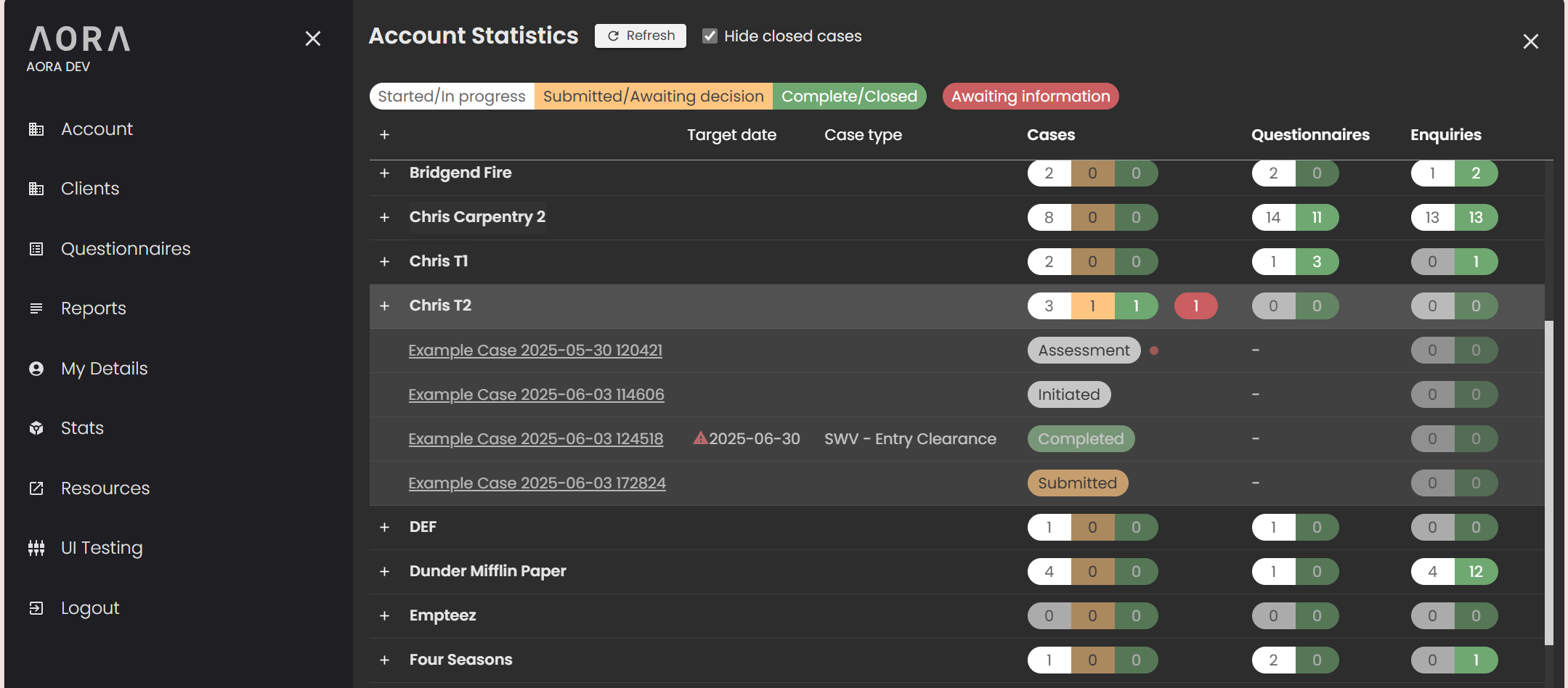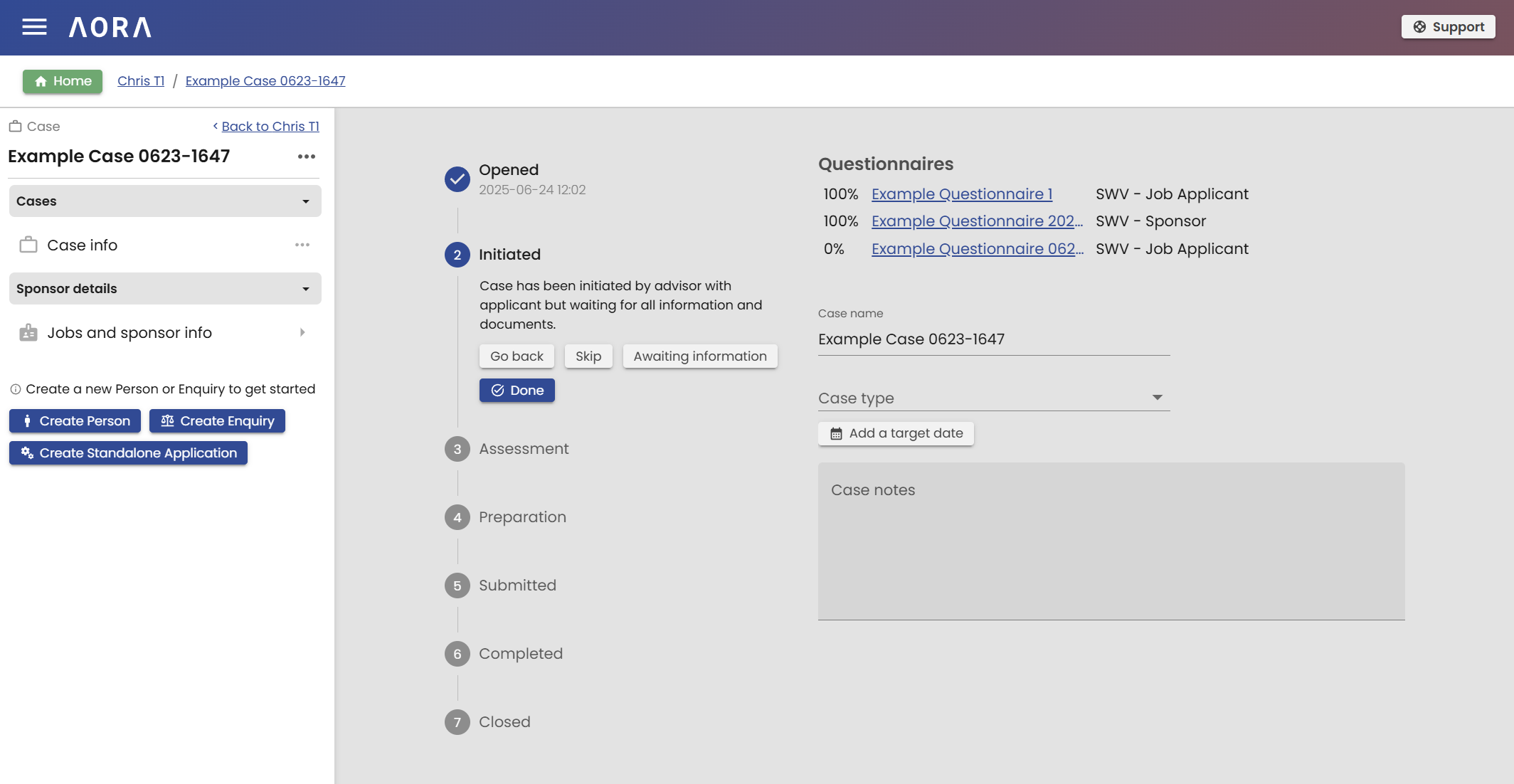AORA for Global Mobility Consultants
AORA Automation for Faster Casework
An immigration case requires gathering data from the client and applicant, assessing eligibility, (ideally) preparing a Client Care letter, and completing the online application forms.
The video shows the process of a UK Skilled Worker visa application being prepared manually and how the same case is prepared using AORA, side by side, showing every step, including completion of the CoS form and Visa Application Form (VAF).
In the example case, the total time taken from a caseworker using AORA is about 20% of the time taken when the caseworker does the case manually (30 minutes versus 2.5 hours).
Thus, AORA empowers each caseworker to complete over 10 cases per day versus about 2.5 cases per day if a caseworker processed these cases manually.
We can provide these times in greater detail upon request.
The processing of Skilled Worker visa applications on AORA is now well established across multiple customers, as well as support for Global Business Mobility visas, across the three most popular routes.
Helpful Dashboards
The dashboard shows, at a glance, activity for each sponsor. The user can drill down into the cases being processed for each sponsor and keep track of the activities and any target dates.

At a case level, the user can see the progress of the case workflow and can post descriptive notes. This is helpful for the sponsor HR staff who can then see at a glance the progress of their matter.

Handling rising costs and competition
Global mobility providers are experiencing rising costs. The biggest cost of servicing clients is caseworking, which, if done manually, is very time-consuming. In contrast, many large corporate employers are trying to lower the fees they pay for immigration services.
To cut costs, some providers are offshoring the casework to teams in low-cost locations, while others are looking for automation.
Offshoring entails the administrative costs of running an overseas entity, recruiting, training, managing and retaining staff whose first language is usually not English. Automation means the work can be done with far less human effort. AORA technology provides full automation. It is up to date with law and policy, scales with demand, provides rigorous compliance and minimises the time between an instruction from a client and delivery of service.
A modern global mobility business should use technology to maximise its corporate and brand value.
Interoperability with in-house systems
We understand that integration with existing systems is key for our larger customers. As a result, we are developing API functions for our first global mobility customer. This enables them to utilise their in-house immigration case management system (CMS), which extracts data from the Sponsor's HR staff or onboarding system and imports it into AORA using its API. Having received the data from the CMS, AORA then performs the automated eligibility assessment, report generation and form completion, automatically notifies the CMS as each step is done (so live progress/status is visible in the CMS), saves the data, whether captured or generated, including completed forms, in the CMS, thereby providing a complete client file for long-term storage. In this way, the AORA platform functions alongside the in-house CMS with seamless, immediate data flow. We do not want to disturb an existing CMS.
Close Cooperation
We appreciate that enterprise customers may require certain assurances to provide long-term security to their operations. Therefore, we can be flexible when it comes to licensing terms with large customers, including bespoke licensing options where appropriate.
Citizenship Cases
British citizenship by naturalisation now has a smart questionnaire for gathering data from the client. Using AORA, the assessment of eligibility, review of data and completion of the AN1 application form takes under 10 minutes in total unless an issue is uncovered in the assessment. This is a huge productivity improvement over the manual process. We also expect to interface with CMS to receive data on the client, such as data previously gathered for the ILR application.
We will be adding automation for ILR and the UK statutory residence test (SRT). We expect that volumes for ILR and naturalisation will soar over 2025-2028 as immigrants reach their 5th and 6th anniversary of arrival in the UK.



